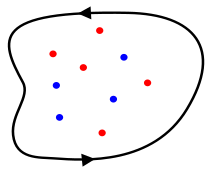Argument principle

In complex analysis, the Argument principle (or Cauchy's argument principle) states that if f(z) is a meromorphic function inside and on some closed contour C, with f having no zeros or poles on C, then the following formula holds
where N and P denote respectively the number of zeros and poles of f(z) inside the contour C, with each zero and pole counted as many times as its multiplicity and order respectively. This statement of the theorem assumes that the contour C is simple, that is, without self-intersections, and that it is oriented counter-clockwise.
More generally, suppose that C is a curve, oriented counter-clockwise, which is contractible to a point inside an open set Ω in the complex plane. For each point z ∈ Ω, let n(C,z) be the winding number of C around the point z. Then
where the first summation is over all zeros a of f counted with their multiplicities, and the second summation is over the poles b of f.
Proof
Let zN be a zero of f. We can write f(z) = (z − zN)kg(z) where k is the multiplicity of the zero, and thus g(zN) ≠ 0. We get
and
Since g(zN) ≠ 0, it follows that g' (z)/g(z) has no singularities at zN, and thus is analytic at zN, which implies that the residue of f′(z)/f(z) at zN is k.
Let zP be a pole of f. We can write f(z) = (z − zP)−mh(z) where m is the order of the pole, and thus h(zP) ≠ 0. Then,
and
similarly as above. It follows that h′(z)/h(z) has no singularities at zP since h(zP) ≠ 0 and thus it is analytic at zP. We find that the residue of f′(z)/f(z) at zP is −m.
Putting these together, each zero zN of multiplicity k of f creates a simple pole for f′(z)/f(z) with the residue being k, and each pole zP of order m of f creates a simple pole for f′(z)/f(z) with the residue being −m. (Here, by a simple pole we mean a pole of order one.) In addition, it can be shown that f′(z)/f(z) has no other poles, and so no other residues.
By the residue theorem we have that the integral about C is the product of 2πi and the sum of the residues. Together, the sum of the k 's for each zero zN is the number of zeros counting multiplicities of the zeros, and likewise for the poles, and so we have our result.
Consequences
This has consequences in considering the winding number of f(z) about the origin, say, if C is a closed contour centered on the origin. We see that the integral of f′(z)/f(z) about C is the change in values of log f(z). Since C is closed we only need consider the change in arg f(z) over C − which will be some multiple of 2π since C is closed (but may wind more than once about the origin). But since by the argument principle
the factors of 2π cancel and so we are left with
where I(C,0) denotes the winding number of f over C about 0.
Rouché's theorem uses the argument principle.
See Also
References
- Rudin
- Alfohrs
- Churchill








